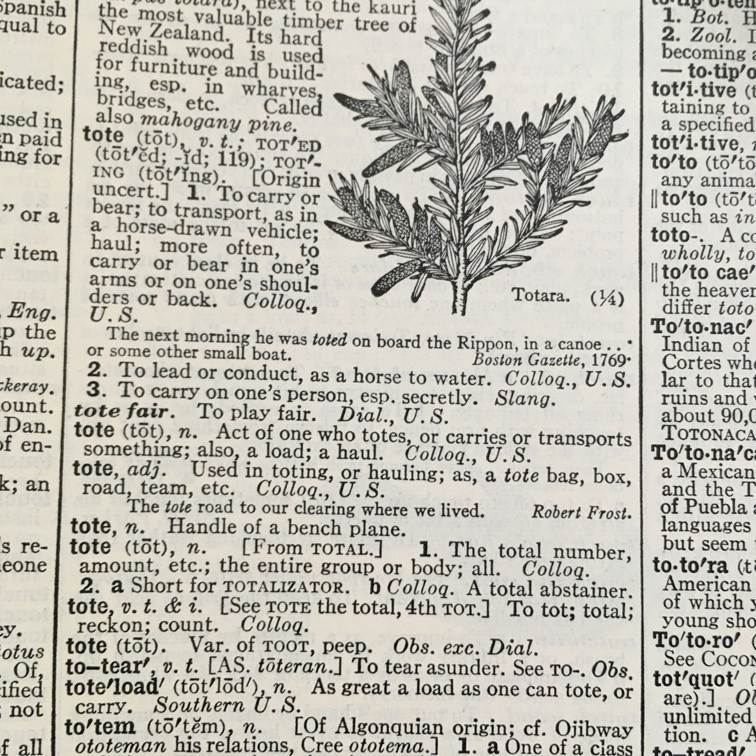This certainly seems like a typo, but the circumstances make it so hard to accept that I thought I'd check whether there's an unusual usage that I'm unaware of.
In the novel The Liar's Dictionary by Eley Williams, I encountered this phrase (broader context to follow): "Whether a dictionary should register or fix the language is often toted as a qualifier." I was struck by the use of "tote"—it seems like it ought to be simply a typo for "tout." And yes, typos are wildly common in all books, especially "these days." But I have a hard time believing it since the poetic injustice in this instance would be staggering: It's in a book about meticulous relationships with words, in the midst of a preface riffing on the extended metaphor of a "perfect dictionary," and in a paragraph starting "That a perfect dictionary should be right is obvious," and an immediate context about rigid and proscriptive control of language. That a typo should slip into this sentence of all sentences seems—well, not inconceivable, but wildly coincidental. And even "tout" seems like a not unproblematic reading, given the "Whether" construction; it seems like a meaning akin to "debate" might be appropriate.
So, every dictionary I can find gives only the expected verb definitions of "tote"—either carry, or "tote up" a sum. But is there perhaps an obscure meaning of tote that fits this sentence?
Here's a broader context:
Preface
Let us imagine that you possess a perfect personal dictionary. A, the, whatever. Not a not-imperfect dictionary but the best dictionary that could ever exist for you.
....
To consider a dictionary to be "perfect" requires a reflection upon the aims of such a book. Book is a shorthand here.
The perfect dictionary should not be playful for its own sake, for fear of alienating the reader and undermining its usefulness.
That a perfect dictionary should be right is obvious. It should contain neither spelling nor printing errors, for example, and should not make groundless claims. It should not display any bias in its definitions except those made as the result of meticulous and rigorous research. But already this is far too theoretical—we can be more basic than that: it is crucial that the book covers open, at least, and that the ink is legible upon its pages. Whether a dictionary should register or fix the language is often toted as a qualifier. Register, as if words are like so many delinquent children herded together and counted in a room; fixed, as if only a certain number of children are allowed access to the room, and then the room is filled with cement.
The perfect preface should not require so many mixed metaphors.
(I suppose that one other explanation is that it's an intentional typo, introduced as a kind of "Persian flaw" on a page decrying "spelling and printing errors." Seems like the kind of two-layered (two-faced?) stunt that might be expected from something that wanders about an extended metaphor about perfection, then coyly draws attention to its own apparent shortcomings ("Oops, I guess I mixed one metaphor too many. Silly me!"), or that avers solemnly that a work "should not be playful for its own sake," then buries metaphorical children in cement, or (in the bit I omitted) waxes fantastic about "a typeface that would be played by Jeremy Brett or Romaine Brooks—a typeface with cheekbones," or daydreams about how leather covers, flicked with a thumbnail, "make a satisfying fnuck-fnuck sound."
But still implausible.

